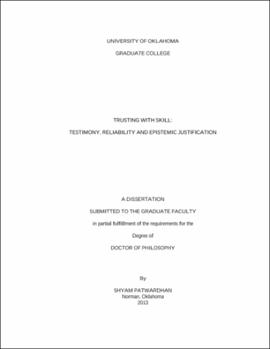| dc.contributor.advisor | Riggs, Wayne | |
| dc.creator | Patwardhan, Shyam | |
| dc.date.accessioned | 2019-04-27T21:26:39Z | |
| dc.date.available | 2019-04-27T21:26:39Z | |
| dc.date.issued | 2013 | |
| dc.identifier | 99196453502042 | |
| dc.identifier.uri | https://hdl.handle.net/11244/318708 | |
| dc.description.abstract | The majority of what you believe is based on the testimony of others; what your parents and teachers have taught you, what you read online or see on the news, etc. And most of the time you accept what these sources tell you without independently verifying them with your own senses or reasoning. If these beliefs (as well as all of the beliefs built upon them) are thought to be justified, then an account of testimonial justification must be detailed which can account for this justification. If such an account cannot be given, it at best becomes a mystery how those beliefs are justified, and at worse you are thrust into a new kind of skepticism since most of what you believe will fail to be knowledge. In this dissertation I examine the two main accounts of testimonial justification in the literature, show how each is inadequate, and ultimately give my own account of how beliefs based on testimony can be, and usually are, justified. | |
| dc.description.abstract | Chapters One through Four examine the two main theories of testimonial justification, reductionism and non-reductionism, and I show that both views possess fatal flaws which render them unsuitable as plausible explanations for how agents can justifiably hold testimonial-based beliefs. In Chapter Five I examine a couple of promising nonstandard accounts of testimonial justification; Jennifer Lackey's `duelist' account and Sanford Goldberg's `extendedness hypothesis,' and ultimately dismiss these well. Finally, Chapter Six ends the dissertation by detailing my own account of testimonial justification and shows how it can avoid the problems which plague the theories above. | |
| dc.format.extent | 190 pages | |
| dc.format.medium | application.pdf | |
| dc.language | en_US | |
| dc.relation.requires | Adobe Acrobat Reader | |
| dc.subject | Testimony (Theory of knowledge) | |
| dc.subject | Knowledge, Theory of | |
| dc.subject | Reductionism | |
| dc.title | Trusting with Skill: Testimony, Reliability and Epistemic Justification | |
| dc.type | text | |
| dc.type | document | |
| dc.thesis.degree | Ph.D. | |
| ou.group | College of Arts and Sciences::Department of Philosophy | |
